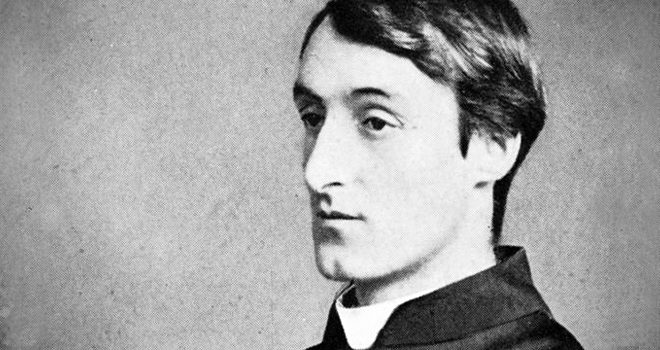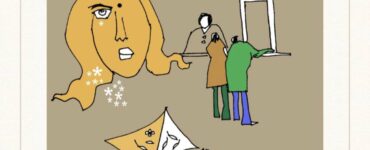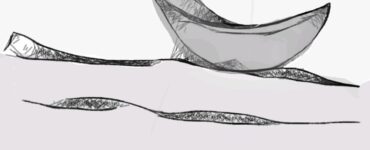By Gerard Manley Hopkins
Part-6 ( Verses 11-12) ( 15-08-2020)
Part II
11.Some find me a sword; some
The flange and the rail; flame,
Fang, or flood” goes Death on drum,
And storms bugle his fame.
But wé dréam we are rooted in earth—Dust!
Flesh falls within sight of us, we, though our flower the same,
Wave with the meadow, forget that there must
The sour scythe cringe, and the blear share come.
Part Two of the poem begins with Death drum. Death is beating the drum in the streets and crying about its many tools of operation. Some find their death in a sword; some in a defective rail or flange. ( A flange is a rim or an orb that is used to strengthen the rails and keep them in their position. Trains, planes, ships are all speedy carriers of Death.Hopkins studied a lot about train accidents. In his study he found that most of the accidents are caused by human negligence- broken rails and wheel flanges. Hopkins had a fairly good information about the shipwrecks too, for his father was in the marine insurance business. ) Sea storms “bugle his fame”. The howling of a storm is like the bugle of a huge hunter. Also, the bugle is a victory cry, the cry of the triumphant Death.
Death is everywhere. It is creeping in the grass as much as it rises like a storm. But man thinks he goes on forever. Man does not think that he is dust. (Genesis:. 3:19 “ for dust thou art, and unto dust shalt thou return”.)
The unpleasant scythe makes one cringe, (“cringe”, cause to cringe or buckle.) Man sees people die before him everyday , but goes on as if he is immortal, like the flower that sees flowers fall to the scythe before it, but waves happily with the meadow . (“Flesh falls within sight of us, we, though our flower the same, Wave with the meadow”). The scythe is on his neck , but man goes on happily unaware that the plough share (“blear share”) is at its task,and we would be reaped too, sooner or later. (‘All flesh is grass, and all the godliness thereof as the flower of the field. The grass withereth, the flower fadeth….’ Isaiah 40:6-7).
12.On Saturday sailed from Bremen,
American-outward-bound,
Take settler and seamen, tell men with women,
Two hundred souls in the round—
O Father, not under thy feathers nor ever as guessing
The goal was a shoal, of a fourth the doom to be drowned;
Yet did the dark side of the bay of thy blessing
Not vault them, the million of rounds of thy mercy not reeve even them in?
After the Death drum in v.11, the poem starts the narrative part of the doomed voyage. Hopkins gives facts and figures related to the ship. The ship left Bremerhaven port (“Hurling the haven behind”. v.13; on a Sunday.( Hopkins takes “haven” from the name of the port,Bremerhaven). It went spinning into “the widow-making unchilding unfathering deeps”. v.13) . There were two hundred, men and women. One fourth of them were drowned. Hopkins’s struggle to understand the ways of God starts here with a series of questions, or rather wonderings. For, questions expect answers; wonder ends in acceptance.
The doomed passengers, were they under God’s protection?( “under thy feathers”) They had the least suspicion that their destination was the depths of the sea? (“nor ever as guessing /The goal was a shoal”.) Is the storm and their doom “the dark side of the bay of thy blessing”? God’s “million of rounds of thy mercy not reeve even them in?” (V.12 ) A series of questions, which are questionings too.
On the way near the Kentish Knock, “She struck—not a reef or a rock
But the combs of a smother of sand” ( v.14) . It was dark and “night drew her
Dead to the Kentish Knock”. The pun on “Dead” is obvious, straight , and, doomed to die. The ship was settling in the sand. Twelve hours of sinking in the sands, “Hope was twelve hours gone” . In those terrible twelve hours they aged, mourned their own death, (“Hope had grown grey hairs, Hope had mourning on…”v. 15. ). No one to warn of the sands, and no hope of any rescue, in that darkness. “Nightfall folded” (v.15) the passengers like sheep for slaughter.
A dare devil (“dreadnought”) attempted to save the women on board,but “what could he do /With the burl of the fountains of air, buck and the flood of the wave?” It was not the night that was cold, but God. “They fought with God’s cold— /And they could not and fell to the deck.”( v.17) . “Night roared”, and there was rabble, “The woman’s wailing, the crying of child without check—”. And out of this “woman’s wailing” rose a tall nun. And she’s the main figure of the poem, and she turns the storm into a harvest, (“Till a lioness arose breasting the babble, /A prophetess towered in the tumult, a virginal tongue told.” ) The words to note here are “a virginal tongue told.” Amidst the rabble/babble,( suggestive of the Tower of Babel) amidst the tumult, “a virginal tongue told”. “ Told” not asked.( Also, suggestive of the church belfry,”toll” ). Against the roaring of the dark storm ( “With the sea-romp over the wreck. /Night roared”), the tall nun roared like a lioness (“ a lioness arose breasting the babble”). She rose like a tower of lighthouse in the dark sea, ( “A prophetess towered”).
The heroine/prophetess, the tall nun, is introduced in v.17.The rest is her story of Christ’s reenactment of his crucifixion. Foran eternal process enacted in the devoted.
Titbits:
Robert Bridges was Hopkins’s closest friend and bitterest critic. Hopkins sent him every poem he wrote, and pat came back Bridges’s bitter comments. But Bridges preserved every piece Hopkins sent to him. And it was Bridges who was responsible for the publication of Hopkins’s work, forty years after the latter’s death, though.









Add comment